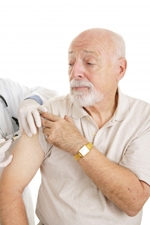Here is a checklist of the vaccines that are routinely offered to everyone in the UK for free on the NHS, and the age at which you should ideally have them.
Eight weeks old
- Diphtheria, tetanus, pertussis (whooping cough), polio and Haemophilus influenzae type b (Hib, a bacterial infection that can cause severe pneumonia or meningitis in young children)and Hepatitis B given as a single injection known as DTaP/IPV/Hib/HepB
- Meningococcal B
- Pneumococcal disease
- Rotavirus
Twelve weeks
- Second dose (DTaP/IPV/Hib/HepB)
- Rotavirus
Sixteen weeks
- Third dose (DTaP/IPV/Hib/HepB)
- Meningococcal B, second dose
- Pneumococcal disease, second dose
One year old
- Hib and Meningitis C (Hib/MenC given as a single injection)
- Meningococcal B, booster
- Pneumococcal disease, booster
- MMR (measles, mumps and rubella), given as a single injection
Two to eight years old (including children in Reception class and school years 1-4)
- Influenza (flu nasal spray given annually)
3 years and 4 months, or soon after
- MMR second injection
- Diphtheria, tetanus, pertussis and polio (DTaP/IPV), given as a 4-in-1 pre-school booster
Children aged 12 to 13 years old
- The HPV vaccine helps protect against human papillomavirus (HPV). It’s recommended for children aged 12 to 13 years old and people at higher risk from HPV.
- Men under 45 who have sex with men, and other people at higher risk of HPV please contact your sexual health clinic for your a free vaccine.
- For further information follow the link https://www.nhs.uk/vaccinations/hpv-vaccine/
Around 14 years (school year 9)
- Tetanus, diptheria and polio booster (Td/IPV), given as a single injection
- Meningococcal Groups A, C, W and Y
65 years and over
- Flu (every year)
- Pneumococcal
70 years old
- Shingles
75 year old
- RSV
- If you are pregnant (from 28 weeks of pregnancy) you are also eligible to have an RSV vaccination. This will help protect your baby for the first few months after they’re born
Vaccination Schedule
Click here for the complete routine immunisation schedule for the current year
Seasonal Flu Vaccination
Influenza – flu – is a highly infectious and potentially serious illness cause

d by influenza viruses. Each year the make-up of the seasonal flu vaccine is designed to protect against the influenza viruses that the World Health Organization decide are most likely to be circulating in the coming winter.
Regular immunisation (vaccination) is given free of charge to the following at-risk people, to protect them from seasonal flu:
- people aged 65 or over,
- people with a serious medical condition
- people living in a residential or nursing home
- the main carers for an elderly or disabled person whose welfare may be at risk if the carer becomes ill
These links all come from trusted resources but if you are unsure about these or any other medical matters please contact your doctor or pharmacist for advice